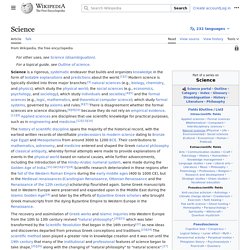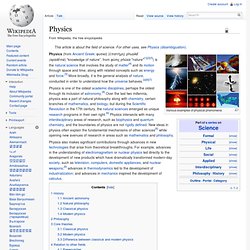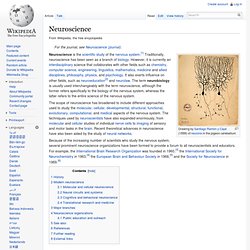

Biology. History The objects of our research will be the different forms and manifestations of life, the conditions and laws under which these phenomena occur, and the causes through which they have been effected.

The science that concerns itself with these objects we will indicate by the name biology [Biologie] or the doctrine of life [Lebenslehre]. Although modern biology is a relatively recent development, sciences related to and included within it have been studied since ancient times. Natural philosophy was studied as early as the ancient civilizations of Mesopotamia, Egypt, the Indian subcontinent, and China. However, the origins of modern biology and its approach to the study of nature are most often traced back to ancient Greece.[6] While the formal study of medicine dates back to Hippocrates (ca. 460 BC – ca. 370 BC), it was Aristotle (384 BC – 322 BC) who contributed most extensively to the development of biology. Foundations of modern biology Cell theory Main article: Cell theory Genetics. Cell. Trends in Biotechnology. Trends in Cell Biology. Trends in Ecology & Evolution. The American Journal of Human Genetics. Chemistry & Biology.
Host & Microbe. Immunity. Structure. Metabolism. Developmental Cell. Stem Cell. Current Biology. Biophysical Journal. Science General. Systematic enterprise that builds and organizes knowledge The Universe represented as multiple disk-shaped slices across time, which passes from left to right Modern science is typically divided into three major branches that consist of the natural sciences (e.g., biology, chemistry, and physics), which study nature in the broadest sense; the social sciences (e.g., economics, psychology, and sociology), which study individuals and societies; and the formal sciences (e.g., logic, mathematics, and theoretical computer science), which study abstract concepts.

There is disagreement,[19][20][21] however, on whether the formal sciences actually constitute a science as they do not rely on empirical evidence.[22][20] Disciplines that use existing scientific knowledge for practical purposes, such as engineering and medicine, are described as applied sciences.[23][24][25][26] History Early cultures Classical antiquity In classical antiquity, there is no real ancient analog of a modern scientist. Notes. Science. Nature. Raphael Lis, Charles C.

Karrasch, Michael G. Physics. Various examples of physical phenomena Physics is one of the oldest academic disciplines, perhaps the oldest through its inclusion of astronomy.[8] Over the last two millennia, physics was a part of natural philosophy along with chemistry, certain branches of mathematics, and biology, but during the Scientific Revolution in the 17th century, the natural sciences emerged as unique research programs in their own right.

[b] Physics intersects with many interdisciplinary areas of research, such as biophysics and quantum chemistry, and the boundaries of physics are not rigidly defined. New ideas in physics often explain the fundamental mechanisms of other sciences[6] while opening new avenues of research in areas such as mathematics and philosophy. Physics also makes significant contributions through advances in new technologies that arise from theoretical breakthroughs. History Ancient astronomy. Physics. New Journal of Physics. Within the last two decades, quantum technologies (QT) have made tremendous progress, moving from Nobel Prize award-winning experiments on quantum physics (1997: Chu, Cohen-Tanoudji, Phillips; 2001: Cornell, Ketterle, Wieman; 2005: Hall, Hänsch-, Glauber; 2012: Haroche, Wineland) into a cross-disciplinary field of applied research.

Technologies are being developed now that explicitly address individual quantum states and make use of the ‘strange’ quantum properties, such as superposition and entanglement. Neuroscience. Neuroscience is the scientific study of the nervous system.[1] Traditionally, neuroscience has been seen as a branch of biology.

However, it is currently an interdisciplinary science that collaborates with other fields such as chemistry, computer science, engineering, linguistics, mathematics, medicine and allied disciplines, philosophy, physics, and psychology. It also exerts influence on other fields, such as neuroeducation[2] and neurolaw. The term neurobiology is usually used interchangeably with the term neuroscience, although the former refers specifically to the biology of the nervous system, whereas the latter refers to the entire science of the nervous system. Because of the increasing number of scientists who study the nervous system, several prominent neuroscience organizations have been formed to provide a forum to all neuroscientists and educators. History[edit] Trends in Neurosciences. Genes, Brain and Behavior. Nature Neuroscience.
Trends in Cognitive Sciences. Journal of Neurochemistry. The Journal of Neuroscience. Neuron. Behavioral and Brain Sciences.